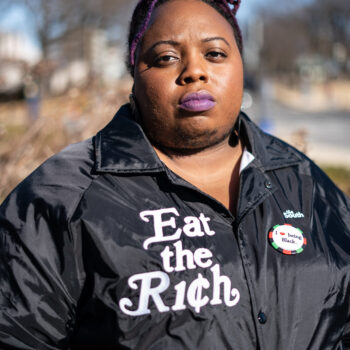On January 6, Trump supporters and white supremacists stormed the Capitol, culminating in a horrific spectacle of violence that shocked the nation. With the threat of more violence at the Inauguration on the horizon, local activists and organizers mobilized to protect residents, disrupting the far right’s plans to return to the District by successfully targeting businesses in an effort to shut down DC. Mat Hanson of The Forge sat down with Makia Green, an organizer with Black Lives Matter DC and the DC Working Families Party, to talk about how local activists organized against white supremacists to deny them a platform, what an abolitionist response to violent white supremacists looks like, and their vision for freedom and liberation in this moment. This interview has been edited and condensed.
Tell us about the organizing efforts in DC against white supremacy, especially around the insurrection.
We’ve been counter-protesting white supremacists in DC for years now, especially after Charlottesville. Starting around Election Day, the Proud Boys and Trump supporters decided they would come to DC, they would protest, they would enact violence on people, not just counter-protesters, but just anyone walking around the streets — [especially] trans people and Black people. There was a lot of violence happening.
They tore down the art at Black Lives Matter Plaza. The police did nothing. One of the co-organizers for Black Lives Matter DC, Nee Nee Taylor, called out the police, saying, “Y’all have been here pepper spraying us, kettling us, telling us where we could stand, where we couldn’t, all while we were fighting for Black people. These people are here just to be violent, just out of anger and are actively tearing down the art here, and you treat me as a threat.”
When we saw that there was going to be another big Trump rally, we knew that meant violence. We knew that the police and local government and federal government were not going to do what was necessary to protect Black people in DC. So we wanted to organize in a way that did not involve the police. We worked with Shut Down DC to organize the Airbnb campaign, as well as the hotels campaign. We began calling restaurants to tell them not to serve white supremacists. We called all of the hotels. Many of them were resistant, but we had thousands of people volunteering, and we were ultimately successful.
Tell us how the #DontRentDC campaign came together.
It really started the night of January 6. After the rioters left the Capitol building, many of them came back to Airbnbs in our communities and brought the same energy they had at the Capitol building with them. DC neighbors started to post on our local listservs and in text threads to one another: “There are Proud Boys staying on such-and-such block; if you are walking over there, please be careful.” The white supremacists were harassing neighbors who were out walking their dogs or coming home from work and everyone knew the police would not help.
So when we started to hear that white supremacists were going to come back for Inauguration Day, all those same community networks lit up. Neighbors started to spread the word to each other: “If you have an Airbnb, please don’t rent it out during Inauguration week.” We all knew this was a moment to keep our community safe. One person started the hashtag on Twitter: #DontRentDC.
How did you build your pressure campaign, and how did you pull it together so quickly?
We contacted Airbnb hosts directly. Using the information on Airbnb’s website, we compiled a spreadsheet of every listing in the DC region — more than 3,000 in total. On Monday morning, we put out a call for volunteers to help send messages to individual hosts. More than 500 people volunteered and, together, we sent messages to every listing in the region by Tuesday evening. These messages initially asked hosts to cancel all reservations for Inauguration Week, but we quickly heard from allies working with unhoused neighbors that this would make some vulnerable folks lose their shelter for the week. We rapidly pivoted and changed our ask for hosts to decline any new reservations for the week and thoroughly vet existing reservations. In these messages, we also made sure hosts realized many white supremacists were lying about their reason for coming to town. That was probably the single most important part of our communications with hosts. We heard from hosts things like, “Now that you mention it, it does seem fishy that these guests want to do ‘historical sightseeing’ during this particular week.” The majority of hosts were supportive. Several of these hosts asked for our help getting Airbnb to waive their cancellation fees, so hosts could cancel reservations without penalty. On Tuesday morning, we sent a public letter to Airbnb asking them to waive host cancellation fees. We got a boilerplate response from the company underscoring their “commitment to safety” but nothing more.
How did you escalate from there? And how did you leverage the gains you were extracting from Airbnb to get others to do the right thing?
On Wednesday morning, Airbnb corporate announced they would cancel all reservations in the DC area during inauguration week and reimburse hosts for their lost business. This was the single most effective action the company could have taken to keep white nationalists out of the region, and that’s fantastic. It was also really important that they chose to pay hosts for the lost business: that prioritized the people who make their business possible, and it’s something we should see more of from corporations that operate in our communities. It also made our parallel ask to hotels even more urgent. We called on hotels in the region to close completely and to pay their workers to stay home during this same timeframe, and at our press conference on Thursday outside the Capitol Hilton, we could point to Airbnb as an example of a company doing the right thing.
For the most part, this campaign succeeded: very few white supremacists stayed in DC during inauguration week. But we know they’ll be back. And we hope hotels and Airbnb hosts will continue doing whatever it takes to prevent violent racists from coming here in the future.
In DC, activists and organizers have employed different strategies to confront white supremacists, from direct confrontation in the streets to counter protesting and disrupting their networks of support. How should we think about how to confront white supremacists?
When we want to organize against white nationalism and white supremacy, we have to do it on our own terms. It is incredibly important that as we are trying to keep our people safe that we reject the government’s attempt to corrupt our anger against white supremacy, that we don’t make calls for increased militarization or increasing the police state because we understand the fundamental connection between white supremacy and the prison industrial complex.
The right in this country is increasingly embracing a more apartheid style of democracy and working overtime to disenfranchise voters of color. What are your thoughts on this?
There’s a reason why white supremacists are trying to make it harder for people to vote because they know that when we vote, we will vote in the interest of the many and not the few. That isn’t to say that voting is going to undo white supremacy, but there is a reason why white supremacists want to stop us from voting. Everyone, non-citizens, people who are incarcerated, should have the right to vote.
The center-left needs to understand that the ruling class of white supremacists don’t play by the rules you’ve been taught to follow. History shows, whether they be status quo, respectability norms, or actual laws, they will re-write the rules to fit their narrative and protect their power while the middle class left is still gawking at their audacity.
Since the in insurrection, there has been a lot of concern over calls for new domestic terrorism laws, which can be used against people of color. As an abolitionist, can you tell us what accountability and justice could look like in this moment?
It’s important to note that using terms like “domestic terrorism” often validates a system that has been oppressing Black migrants, Black Muslim people, and Black freedom fighters. So we don’t use the term “domestic terrorists” to talk about white supremacists because the things that they did are truly American. If you think about the history of how this country was founded, how land was stolen, how my people were enslaved — violence is actually not abnormal to this country.
We need to have a conversation about our language and the things that we fight for. They want to increase domestic terrorism budgets, but that money isn’t spent to keep Black people safe. It’s spent to create or colonize the rest of the world. It’s spent to keep people away from their families, to deport fathers and mothers and sisters, and that is not the solution to upending white supremacy.
Look at what’s happened to some of the people who took part in the Capitol riot, people who have been let go, charges dropped, people who’ve gone on vacations. The carcel state institutions that many people trust to hold those sorts of people accountable are not interested in doing that, and stronger domestic terrorism laws isnt going to solve it.
We want to build a movement for freedom and liberation, and not just react to the forces on the right. Tell us about what an affirmative anti-racist vision looks like.
Freedom only comes when we repair the historic harms against Black and brown communities and nurture a working-class revolution. We need to take on the Republican Party and the Democratic Party. Both of them have done things to further increase the carceral state, to further increase the white supremacist state. Black people deserve the most basic human rights, housing, healthcare, access to food, the ability to raise our children. We need the ability to live in a world that is actually safe, free of both community violence and police violence, and we need to release our families that are inside prisons and detention centers, facing death in the middle of a pandemic.
We need the ability to exist outside of the current parameters that they set for us. Freedom looks like my grandmother not having to worry where food is going to come from. Freedom looks like my grandmother being able to live in public housing that doesn’t have infestations on a monthly basis. Freedom looks like my little brother who’s had issues with staying in school, being able to still have opportunities to have a full life and me not being afraid that his next mistake is going to put him in jail because someone doesn’t see his whole humanity and doesn’t see him as the child that he is. That is what freedom looks like for me right now.


